Sandwich Sold Surreptitiously
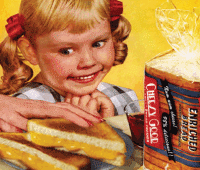
“I’m worried that I’m getting too busy. I’m instituting a friends and friends-of-friends policy. I kind of want to quit, it’s getting too big, but I want to feed these people…. I don’t know how much longer I want to do it because I’m living in fear. It would be such a stupid thing to get in trouble for.”
-”Ronnie,” an underground grilled cheese dealer, discusses the stresses of his clandestine profession. Also included: a description of how “Ronnie” prepares his illicit wares (“He grills in a pan with unsalted butter, then wraps the sandwiches in tin foil and pops them into a 500-degree oven for a few minutes to achieve maximum crispiness”). Yes. Hello, August!
The Way We Quit Internships Now: With a Bang
The following is a real email sent by an intern to the editor-in-chief of a well-known web publication.
From: [REDACTED]
Date: Mon, Aug 2, 2010 at 12:34 AM
Subject:
To: [THE BOSS]
[REDACTED],
This is not going to work out. After last week, I can no longer in good conscience stay at [NAME OF PUBLICATION]. I don’t think making bar graphs and quoting other websites is going to make me be a better writer. I quit.
Good luck selling those [NAME OF ONE OF THE PUBLICATION’S ADVERTISERS].
[REDACTED]

'Times' Profile Guessing Game: Laura Linney? Or Patricia Clarkson?
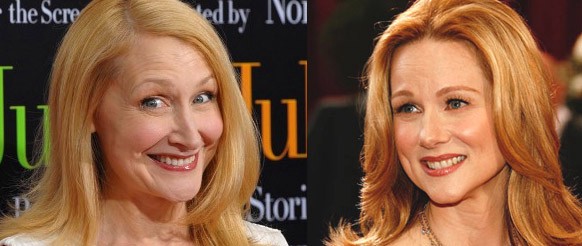
Two profiles diverged in a gray newspaper-and sorry I could not read both. Let’s play: Which Times’ actress profile was it? Was it… Patricia Clarkson or Laura Linney?
1. “It’s a paradox in keeping with a career built on contradictions: over 25 years she has reserved the right to be both chameleonic outlier and known quantity, self-effacing artist and scene-stealing operative, consummate mother and quintessential dame, indie stalwart and A-list darling.”
2. “She bumped into Antonio Banderas, then Cate Blanchett: hugs all around.”
3. “And yet her sense of wonder endures. Either that or she’s a more gifted actress than even her fiercest admirers realize. “
4. “’There’s something about her personality that comes through,; he said, describing the mixture of character immersion and personal impact he needed. ‘Yet she’s able to be totally convincing in the role. I have been fooled by her many times.’”
5. “In her 20s, with her classic features and elegant figure, she was more 1940s femme noir than 1980s ingénue; a film career would have to be custom made. ‘I really wanted to have an artistic life,’ she said, reflecting on the Hollywood hustle. ‘I wanted to do things that thrilled me, that sent me, that mattered.’”
6. “To write about her is to succumb gradually to desperation and hopelessness — there just doesn’t seem to be any route around the fluffiest of the puffiest of articles — and to grovel for even a grain of dirt. Is it possible she doesn’t recycle? Files her taxes late? Chews her cuticles?”
7. “These days her thoughts turn frequently to how lucky she is — how lucky anyone is — simply to experience the pleasure of being alive. It’s a cliché, yes, but isn’t it true? And isn’t it often forgotten?”
8. “’Things got weird,’ she said, referring to a dearth of roles and damnably silent phone. ‘Things suddenly just became very difficult for me. I had to dig way deep down inside and figure out: Do I have the stamina? Can I withstand this hailstorm of rejection to get what I really want?’”
9. “In fact, she has done much of her highest-profile (and best) work since she turned 40. “
10. “In fact she’s a borderline cutup, a warm, often antic presence who searches our every exchange for comic points of entry.”
11. “’I’m not someone who likes to have my picture taken, let alone see it plastered all over the place,’ she said. ‘And I don’t know what the reaction will be.’”
She went on to add, philosophically: ‘I just have to concentrate on doing what I do. I signed up for this.’”
12. “Although she dreamed from an early age of being an actress, she was initially reluctant to articulate that. She didn’t want to get ahead of herself, didn’t want to denigrate the profession by implying that it required anything less than years of preparation. At Brown she majored in theater arts, then continued her studies at Juilliard.”
13. “’I have very strong ideas and strong convictions, and I think I have brought to fulfillment the life I’ve really always wanted,’ she said. ‘There isn’t really anything I would change about my career right now.’
She paused, the mischief returning to her eyes. ‘O.K., a few things,’ she relented. ‘Usually involving a check with some zeros.’”
14. “She didn’t have the distinctive beauty of many a leading lady; she didn’t have the edge or flagrant sexiness to pull off a femme fatale. A surface reading of her said ‘vanilla’ — or maybe, given the air of Southern graciousness passed down from her mother, ‘butter pecan’ — but nothing more complicated than that.”
15. “As we sat in the new Jean-Georges Vongerichten restaurant ABC Kitchen, she worked her way through a curious pea-centric lineup of pea soup and pea salad and talked about aging, and about her mystification and frustration with so many people’s rebellion against it. She conceded that sagging skin, waning energy and creaky joints aren’t fun, but said that the early deaths of beloved friends had opened her eyes to the fact that growing old is the greatest of blessings. ‘A lot of people don’t get that privilege,’ she said. ‘And there’s an extreme disrespect toward that that’s cuckoo.””
It’s a good thing Hope Davis wasn’t profiled this weekend, right?
Answers:

Understudies! How 'Rent' Taught Us All To Be Different
by Bex Schwartz

Let’s examine the centerpiece of Rent, the Up With People On The Fringe-esque routine that closes the first act: “La Vie Boheme” is a tribal chant heralding any and all things counterculture. It’s “We Didn’t Start the Fire” from the perspective of East Village artists. It’s a list of everything that you need to know to be hip. There is a song by King Missile called “It’s Saturday” that opens with the line, “I want to be different, just like everyone else I want to be like.” This sentiment is the heart of “La Vie Boheme.” The number embodies an unembarrassed need for self-expression and a yearning for recognition that usually gets supplanted in adulthood by the desire to appear aloof (even though, hello, you’re wearing an army jacket, Captain Alt).
Imagine lying on your stomach in front of your parents’ stereo. The carpet smells a little like the cats and a little like chardonnay. You kick your feet back and forth as you study the libretto that came on the CD insert with the double-disc Rent original cast recording. Can you identify every person who appears in the lyrics? Do you know who Uta is? (Yes: Uta Hagen. You, of course, have a copy of Respect for Acting because you want to be an actress and it is canon.) What about Buddha? (Yes. He’s on that shirt you bought from Urban Outfitters and also the Beastie Boys are suddenly really into him). And Pablo Neruda? (Sure. He wrote that book you should read someday.) Ginsberg, Dylan, Cunningham and Cage? Check, check, check, and check-wait, do they mean Bob Dylan or Dylan Thomas? But doesn’t Bob Dylan actually imply Dylan Thomas anyway? Exactly. You’re safe. Don’t sweat it.
And maybe you’re not exactly sexually active yet. But you know that when you someday do start sleeping with someone (anyone, please!), you’re going to be totally cool with whatever. Anything will go! Whatever your imaginary friends who happen to be also be characters in Rent are doing, that’s what you will embrace. To sodomy! It’s between God and me! To S&M;! Cool people do cool things in bed! And so, too will you! Think back to 1996! The internet was in its toddler stage-my friends would chat with people named “MuffdiverMike” in North Jersey chatrooms on AOL but Craigslist didn’t exist yet. The Gulf War started and ended when we were in middle school. “Monica” still meant “one of the Friends” rather than “blue dress and cigar.”
My mom grew up in the atomic age when kids had to duck and cover, when mutually-assured destruction seemed almost imminent. Teenagers in the 1960s turned to free love and psychedelics to escape the threat of widespread nuclear annihilation or the fear of dying in a war they didn’t support. Hair was their musical, and they fought against the conformity of short hair. By the time I was in middle school, the Berlin Wall was down. The scariest things out there were the mean girls and the jocks. Free love? Please. Having sex meant you would get AIDS and die. Drugs? We weren’t doing any, but we all looked like we did because we all dressed like Courtney Love and Kurt Cobain or tried to emulate the heroin chic look we saw in fashion spreads in Seventeen. We just wanted the freedom to be ourselves, like every other self-respecting teenager. Also, there wasn’t too much to define ourselves in opposition to, in the 90’s. There wasn’t much to protest (outside of freeing Tibet or other causes that seemed very far away). And here was the song “La Vie Boheme”-it became our battle hymn and our anthem.
Mom and dad had their own counterculture-they had Hair, which was also a period piece about being a young adult in New York and trying to stay true to thine’s own self and finding kinship within an urban tribe in which everyone fucks each other and occasionally does drugs. In Hair, the enemies are selling out and the Vietnam War. In Rent, the enemies are selling out and AIDS. Your parents were scared of dying in Vietnam. Your friends in Rent are scared of dying in Alphabet City tenements. That was their musical and this is your musical.
My mom was 17 when Hair premiered in 1967. I was 17 when Rent premiered in 1996. My mom also knew something about idealizing fictional characters in rock musicals. She always said she never burned her bra in college but it was okay because she’d seen them do it in Hair. She understood why “La Vie Boheme” became my anthem-when you’re not necessarily cool in real life, you can aspire to greatness by memorizing the lyrics to your generation’s protest-showtunes.
As Mark and the rest of the cast sing and dance on the tables at the Life Café, they recite a litany of awesomeness. They namecheck everything that you long to embody when you’re 17. It is 1996 and you are struggling to define yourself as a proto grown-up, and along comes a Cliff’s Notes for what you need to know to enter maturity as a confident nonconformist. “La Vie Boheme” gives you hope-Bohemia is not dead, not at all: It is just over the hill of grown-upitude, and when you get there it will all be wonderful and angry and full of people who are different, exactly like you.
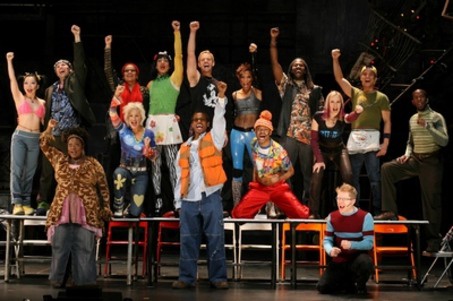
Bex Schwartz likes bears, Robyn, and, oh yes, toffee.
Understudies! Casting The Sequel To 'A Chorus Line'
by Daisy Klaber
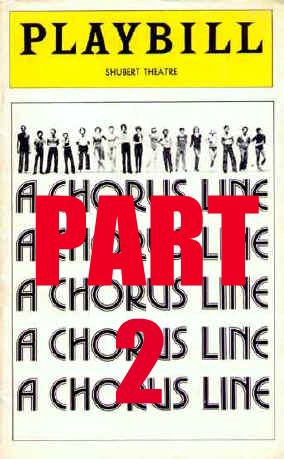
When my best friend and I were nine, and the rest of the neighborhood was playing house, we were perched on PVC-inspired bar stools in the basement, rubbing our temples and sighing to one another about how hard it was to find good talent.
I mean, casting a show is a nightmare in any case, but the stakes were extra high here, what with Michael Douglas breathing down our necks [Lucky Lights® exhale]. It’s hard enough to find an individual who shines, but to pair up two singer/dancers who both embodied the spirit of the sequel to A Chorus Line that we were workshopping, and who were also kindred spirits with each other? God. Wish me luck; the same to you.
Scribbling copious, exasperated notes about our imaginary gypsies (‘Sloppy!’ ‘Doesn’t WANT it enough!’ ‘Everybody thinks this comes naturally. Honey, it doesn’t. Learn the combo’), we were critical and demanding. But judgey as we were, up there at the hi-top table with our clipboards, we didn’t actually see ourselves as judges. Well, not of a contest anyway. To us, there was no Best, but only those who were Right For The Part and those who Were Not.
It was all about the art, you see, not about being a star. We were telling a story, making musicals happen. For our project, we were looking for real players-people who’d work to get into a character and a company and a show, not stand out as a performer. Of course we watched the hell out of “Star Search” backstage, but what self-respecting industry professional didn’t? We found ourselves complaining constantly, though, to any baby brothers who would listen, about the egos, and the misdirected effort, and the transparent self-interest. How could we possibly lose ourselves in your number if you were just gonna caress the mic with that insipid affectation and belt out Whitney Houston hits as if you’d really ever tried to resist being last on his list?
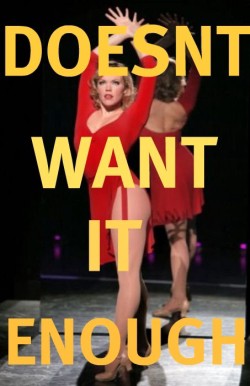
Musical theater is a cooperative experience! Writers and directors and producers and actors and musicians and technical experts and audience members&mdashwe; were all in this together, people. There’s no “I” in “dream.” Exhausting ourselves, we went through pairing after pairing, discussing failure after failure, wondering if we’d ever get it right. Partners do way more than dance. They have to be able to rely on each other to remember and follow the routine, but they also have to be able to riff off of each other when things don’t go as planned. They have to look good and sound good together, sure, but it’s more than that. A real duo brings out beauty and grace in each other, and also sympathetic movement in everyone around them. They help each other feel the height and depth of every moment, and they know when to push and when to catch.
It’s hard enough to find an individual who shines, but find a pair who are also kindred spirits with each other? Almost impossible. We learned that as nine-year-olds, but it’s a lesson that holds true throughout. That’s why I’m so glad that my best friend found her perfect partner. They danced together on Broadway a few years ago, and they vowed earlier this month to dance together for life.
Daisy Klaber would like to apologize to Jackie for sometimes making her be Olivia Newton-John’s “sister.”
The Pitch: How to Remake 'Les Miserables' Into the Next 'Twilight'
by Jessica Ferri
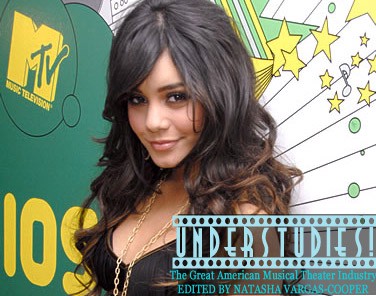
In 1995, French director Claude Lelouch adapted Les Miserables for the screen. Instead of post-Revolutionary France, he transposed the story to Nazi-occupied France. Though this adaptation didn’t get much attention in the states, it’s very successful. You can imagine the parallels during the time periods — and the actors are very good. Perhaps the success of this adaptation pushed for an American film version of the musical. In 1998, Les Miserables was released starring Liam Neeson as Valjean, Geoffrey Rush as Javert, Uma Thurman as Fantine, and Claire Danes as Cosette. It was a flop. (“Made me feel transported back to high school history class,” wrote Roger Ebert.) It’s easy as a director to get too confident when you have Liam Neeson and Geoffrey Rush on a bill but it was tedious and flat, which is the opposite of the play: frothy, heady-and rich with opportunities for hot European actors to rip their shirts off.
It’s as easy as casting it right and not having a horrific script and director.
• Let’s get Gerard Butler in there as Javert, with his stocky frame, swarthy facial hair and bulky muscles he’s perfect for the role. And hey, he can sort of sing! Remember Phantom of the Opera? No, you probably don’t. Well?

• Valjean, besieged father and leader of men, is harder to cast, but I for one would love to see the deft German-born Irishman from Inglorious Basterds, Michael Fassbender take on the part. Valjean takes great emotional depth and an openness-we have to feel for him. Fassbender could do this part in his sleep. And he’s not hard on the eyes, either. Also, he’s European, so he’s cheap.
• For Fantine, the mother heroine and mysterious-respiratory-disease haver, let’s get some real talent in here, maybe even rack up an Oscar nom. Get me Emily Watson post-haste. Watson has that strong matron-peasant look that simply crackles on screen.
• Cosette is such a boring character that it would take a really talented actress to make her shine. Zoe Kazan is a brute of a girl, in the best way possible. Her small part in Revolutionary Road basically stole the show; she’s got the chops and she knows how to use them. Cosette is usually cast as willowy and model-looking — but Kazan could make things interesting.
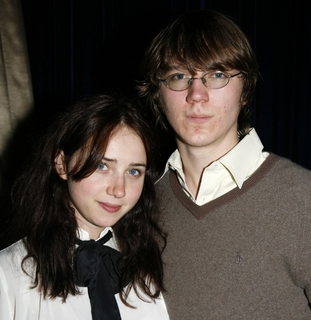
• Marius, the featured love interest, is similarly boring. We’d need someone sweet and young-ish, but he’d also need to equal Kazan’s power. How about Kazan’s real-life boyfriend, Paul Dano? Indie cred: SECURED!
• Eponine, the 14-year-old who sacrifices herself to fulfill the revolutionary role-playing fantasies of her unrequited crush, Marius, is usually played by some vaguely ethnic young lady, mostly likely because Lea Aalonga popularized the part on stage. In movie adaptations she’s similarly “exotic.” Who better for this part than Eva Green? She sizzles. If we wanted to pack the tweens into the seats-and who doesn’t-we may need to take a page from the Disney playbook and cast Vanessa Hudgens.
• For the innkeepers, the skuzzy cajoling wretches that look as though they leaped out of some painting of France’s third class, I say no, NO, NO to ruddy and grubby character actors this time. Let’s scrub these two up and make it so make the audience wants them to slip their hands in your pocket. Easy: John Slattery and Helen Mirren, overboiled silvery sex pots, those two are.
Okay, Hollywood, I just made your musical as relevant as Twilight with a Lady GaGa soundtrack. Let’s get on it.
Jessica Ferri will totally step in and direct it herself if need be.
Oklahoma! at 67: It's Retirement Time
by Katie JM Baker
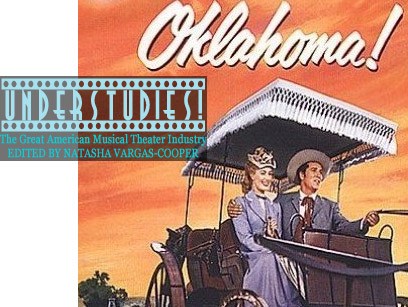
As an extremely passionate fan of (almost) all things musical theater, I do have to honor Oklahoma!’s is milestone status-it is perhaps the most influential American musical ever made. And it was, at least, revolutionary for its time. When it opened on Broadway in 1943, Oklahoma! got rave reviews in almost every paper for, as critic Brooke Atkinson wrote, making “the banalities of the old musical stage … intolerable.” And playwright Thomas Hischak wrote “[Oklahoma!] is the first fully integrated musical play and its blending of song, character, plot and even dance would serve as the model for Broadway shows for decades.” And that’s true: Oklahoma!, Rogers and Hammerstein’s first collaboration, marked in many ways the beginning of the “book musical.” Okay, that’s nice. Oklahoma!-cutesy as a jackrabbit, sugary-sweet as one of Laurey’s gooseberry tarts, subtle as Ado Annie herself-is so earnest and corny that it necessitates the exclamation mark tacked on to the end of its name and also, now that it is 67, a permanent retirement.
Where to start? Oh right. THE ENTIRE MUSICAL IS ABOUT A LUNCH BASKET AUCTION. Okay, I’m not being completely fair: Oklahoma! does touch upon deeper issues, such as why cowboys and farmers can’t be friends, the difference between girls who can’t say no and girls who can, and the race disparities between-oh, kidding, Oklahoma! is pretty much the whitest play ever. The only “ethnic” character is the Persian peddler Ali Hakim, who is not so much “Persian” as just a person who lacks a Southern accent and occasionally refers to rugs. In Oklahoma!, every hot button issue is resolved with a square dance.
For those of you who aren’t familiar with Oklahoma!/don’t remember anything about it other than OHHHHH what a beautiful morning or OKKKKKKKlahoma (and yeah, sorry, songs are about to get stuck in your head), the narrative, when laid out, can be a little shocking.
We’re in Oklahoma Territory, 1906. Cowboy Curly is singing about how beautiful the mornin’ is as he strolls through the equally beautiful Laurey’s yard. Curly and Laurey may be the blandest, most two-dimensional duo in all of musical theater history; think Barbie and Ken, but in gingham. Curly makes some crack about taking Laurey to the lunch basket auction later that night and Laurey taunts him, saying she’d never go with him because he doesn’t have a suitable carriage (Laurey’s somewhat of a stuck up bitch). Curly assures Laurey that she’s incorrect; if Laurey was to accompany him, he’d drive her in a surrey-but not just any surrey-a surrey with fringe on top!
Remember that cringe-inducing scene in When Harry Met Sally, when Billy Crystal runs into his ex-wife while singing “Surrey With The Fringe On Top” on a junky karaoke machine?
There’s a reason why Rob Reiner chose that song: nothing is more humiliating than singing a song from Oklahoma!, in particular this one (although it’s extremely catchy; listen at your own risk). I guess a surrey with the fringe on top is kind of like the 1906 version of Grease Lightning, except instead of envisioning car sex with hot babes Curly rhapsodizes about feeling “a sleepy head near my shoulder/Noddin’, droopin’ close to my shoulder/till it falls kerplop!”
Meanwhile, Laurey and her Aunt, all status- and luxury-greedy, are practically drooling at the thought of silk fringe.
SO. The box social. The Box Social, I shall capitalize it because there is nothing more important than The Box Social in Oklahoma! Creepy (leering, bulky, dumb) farmhand Jud asks Laurey to The Most Important Box Social Of Our Time and she says yes to make Curly jealous. Meanwhile Ado Annie is stuck in a love triangle between the “Persian” and a really, really stupid cowboy. Laurey’s all, “You gotta choose one man,” and Annie’s like, “Hell no, I LOVE kissing!” Laurey doesn’t understand what that feels like, because she is uptight. Of course, free-spirited Annie is consistently portrayed as a ditzy, bumbling idiot, whereas Laurey is a smart, independent woman. Even at twelve, I wanted to slap both of them: Laurey because she just sucks so much in general, and Annie because I had never been kissed and therefore had no sympathy for Annie who just “cain’t say no” to her two lovers. HARD LIFE.
Annie’s dad catches Ali Hakim and Annie in a clinch and forces Ali to marry her. Ali’s pissed because he really just wanted to sleep with Annie and then get the hell out of dodge, but Annie is thrilled because the whole gist of her character is that she’s too stupid to know what’s really going on.
(My friend Eve played Ado Annie in her high school production of Oklahoma! and, like me, found the plot a little lacking. Eve tried to give Annie some “edge” by attributing her promiscuity to poor self-esteem with “a hovering question of childhood sexual abuse.” One day in rehearsal she gave a particularly dark reading and the director barked at her, “This isn’t The Accused!”)
Moving on. What else? Gertie, who has a very obnoxious laugh, flirts with Curly and enrages Laurey. The lamest catfight ever-prompted by the two girls’ comparing baked goods-ensues. On the other side of the farm, Curly tries to convince Jud people would like him more if he was dead and the two of them sing a song called “Pore Jud is Daid” (this part is TRULY bizarre, but also kind of my favorite).
Laurey buys a “magic potion” (really just smelling salts) from Ali the Persian and induces herself into a dream slash FIFTEEN MINUTE BALLET SEQUENCE in which Curly and Jud fight over her (Jud kills Curly, everything becomes clear). The sequence confuses me to no end because isn’t the essential point of a musical to illustrate feelings through song and dance? Therefore, the ballet is like a musical within a musical, and while somewhat revolutionary for its time (Agnes De Mille choreographed), it makes no sense in the context of a play that is more about barrel jumping than pirouettes. Plus, let’s be honest: the only time a dance sequence that long has ever really worked was in the movie Center Stage (v. similar, actually), and even that was pushing it.
Act Two. It’s Box Social time! The farmers and the cowboys brawl over fences and water rights, but Aunt Elin convinces them to be friends with, shockingly, a square dance. Annie’s love triangle is solved in a cute way (she still can’t stop kissing boys, though) and then OMG IT’S TIME TO BID ON LAURIE’S BASKET.
Jud bids. Curly bids. Jud bids. Curly bids. Jud bids two bits more. Etc, etc, until Curly sells all of his possessions (saddle, horse, gun) and wins the basket.
(DUDE. It’s a fucking PICNIC BASKET. If you had saved your money, Curly, you could have taken Laurey to a taffy-pulling party or something the next night and still have Ol’ Blue.)
Jud and Laurey fight, Laurey fires Jud, Laurey runs to Curly, Curly proposes (clearly the next logical step, it’s not like they were barely speaking to each other just twelve hours prior), Laurey and Curly get married, Jud tries to kill Curly with a knife, Jud falls on his own knife. Everyone rejoices, because Jud is dead, Oklahoma is now a state, and Curly and Laurey are off on their honeymoon in-you guessed it!-a surrey with fringe on top.
* * *
In 2002, big gay theater guy Ethan Mordden revisited the show. He wrote: “The parts didn’t just match. They made love to one another. As Rodgers himself put it, ‘The orchestrations sound the way the costumes look.’” This was under the rubric “Six Decades Later, Still the Great American Musical.”
Mordden, whose love for the show is so fervent it almost scares me, views Oklahoma!’s plot in a rather epic light:
While creating an anthem for the land, Rodgers and Hammerstein were also singing of the people who settle on and develop it-all of it. The song is called ‘’Oklahoma,’’ but it really means ‘’Americans’’: their morality and government and spirit, how they learn the arts of compromise and tolerance in order to deserve the liberty that democracy fosters.
For Mordden, the characters “take on the nature of their region, as if pioneering made folks into authoritarians or rebels… one has the feeling that a nationality is being revealed in microcosm, not merely as farmers and cowmen but as personalities.” And poor old Jud is evil incarnate: “Part of this show’s ebullient Americana is the unpleasant truth that evil will keep coming at you until you kill it. One piece of democracy is the harmonizing of discordant agendas. But another piece is the expunging of the wicked.”
I ain’t buying it. Oklahoma! barely scrapes the surface of the themes it attempts to explore. Frontier expansion is more or less summed up as: “Brand new state! Brand new state, gonna treat you great! Gonna give you barley, carrots and pertaters, Pasture fer the cattle, Spinach and termayters!”
And what of the territory’s original residents, hmm?
Mordden’s reading of evil and democracy and liberty has a very specific ring to it-and his thoughts were published in February, 2002, after all.
And as for feminism… Well, Laurey proclaims that “Many a new face will please my eye, many a new love will find me,” about two seconds before clocking Gertie in the face over Curly, and Ado Annie is less of a free-wheelin’ frontier feminist than an easily distracted 5-year-old child stuck in a curvy body. When I think of the true “American Musical,” I don’t think of Oklahoma! but of Gypsy, West Side Story, or even A Chorus Line-musicals that truly and heartbreakingly illustrate the ups and downs of the American Dream.
As much as I make fun of Oklahoma!, I can’t completely despise it since without it there may never have been a Gypsy Rose Lee, Maria, or Diana Morales. But, just as we no longer drive surreys-with or without fringe-it’s time to take Oklahoma! out to pasture.
Man, is it catchy though. I’ll give it that.
Katie Baker (the West Coast Katie Baker, not the East Coast Katie Baker who also publishes here!) was a fervent drama camp attendee from age 7–16, after which she begrudgingly accepted the fact that she has no musical talent.
Understudies! Fingered By Fosse
by Julie Klausner
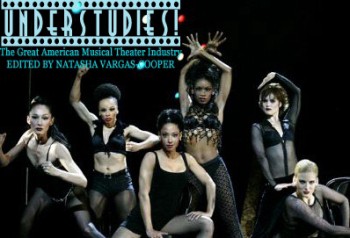
Julie Klausner: A big pet peeve of mine is when people confuse Bob Fosse’s stiff jazz hands for spirit fingers.
Natasha Vargas-Cooper: UGH! Jazz hands are like Lady Liberty’s crown of spikes. They make a precise statement. Spirit fingers are for RENAISSANCE FAIRE WEIRDOS.
Julie: They’re deeply sexual, Fosse’s hands, especially when you consider that he stuck his troll pole in every chorus girl.
Julie: Look at the girls in “All I Care About is Love” from ‘Chicago.’ Rolling around on the floor around Jerry Orbach? That shit is filthy.
Natasha: You’re right.
Julie: This is like the precursor to “stupid drunk chick passed out in dorm room gets fucked.”
Natasha: Sexual delirium, but, like controlled.
Julie: Of Fosse’s muses, I think Liza was the least tabula rasa.
Natasha: Well, sure! There’s so much LIZZZAH packed into Liza.
Julie: Gwen Verdon was his collaborator whereas Anne Reinking embodied that fascist precision of Fosse’s manias.
Julie: And Anne Reinking was the vessel he just filled up.
Julie: Like, creampie style.
Natasha: Anne in sparkly bowler hat of pain!
Julie: She was just glitter, legs, and teeth.
Julie: That’s the kind of mistress you have to be for Fosse, I think.
Julie: Like, “May I move my pinky now?”
Natasha: It’s like he drew her.
Julie: When she gives those hips it’s like she oiled her hinges for him.
Natasha: What psycho-sexual element are we dealing with here?
Julie: It’s that link between fascism and sexuality (and so much glitter).
Julie: That wrist flick in ‘All That Jazz’ kills me every time.
Julie: It’s like gorgeous Malcolm Mcdowell’s eyelashes wide open at the beginning of ‘Clockwork Orange’!
Natasha: OMG.
Julie: And only his foot taps.
Natasha: So sexually menacing.
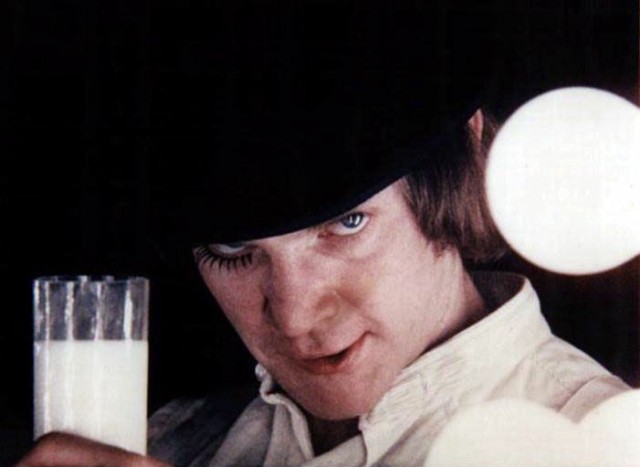
Natasha: So that’s the kind of woman you have to be, huh?
Julie: To be married to that man?
Julie: Well, ask Mrs. Coppola.
Julie: Or like, ask Sharon Tate.
Natasha: *SAD HANDS*
Disney Saved Broadwayâ€"By Hiring the "Most Original Creative Minds in the Room"
by David Ozanich
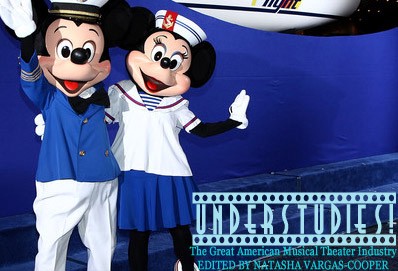
Without Disney, Broadway-and New York theater in general-would be like those depressing days when Chorus Line was the only show to see in a grim Times Square and you had to fight past hookers in rabbit fur coats to get to the box office. Many resent the “Disneyfication” of Times Square. Sure, I had a great time sipping nine dollar low-quality red wines out of plastic glasses at Runway 69 as much as the next gay. Sometimes, in bitter moods, I totally get why this weirdo likes to boycott Disney stores. But one of the great things Disney has done (besides inventing animatronics) is put a massive amount of money behind one of America’s dying art forms-the theatre. (Yes, I’m going to spell it that way because I’m fancy.)
They don’t waste their time with “pared down” productions where the orchestra is reduced to two actors playing recorders and a keyboardist plinking out orchestrations designed for at least 24 real musicians . No, these folks always put mad cash behind their productions-and they still turn a profit.
The surprisingly excellent Mary Poppins is a great example of this. Based on a classic movie that was basically a Broadway musical without ever being one, this show has a strong book, believable characters in conflict, fabulous sets that move up and down and all around, soaring music (much of it new), and a hot bitch with an accent who fucking flies and does magic and is not painted green. It’s also surprisingly dark for a show aimed, primarily, at the elementary school set.

Here’s where the theater cognoscenti start saying “But did you SEE Little Mermaid? It was a clusterfuck of Lisa Frank imagery and chorus boys scooting around on wheelies.” (Technically they were called “merblades.”) Fact of the matter is actually that none of these complainers did see it. I did, though, and it was fun. It was certainly more entertaining than In the Heights, with its faux hip-hop “take” on the life of colorful ethnic types who dream of dancing and being friends in what is basically a drawn-out version of “Sesame Street.”
Another thing Disney has going for it is that they hire truly great theatre artists to create their shows. I spoke via email with Thomas Schumacher, producer and president of Disney Theatrical Group. Here’s what he said about his habit of hiring avant-garde artists: “I like to say that I only had one great idea on The Lion King -hiring Julie Taymor. When creating that show, and all of our shows, we want the strongest, most original creative minds in the room because we want the theatrical experience to work completely on its own terms. It makes sense, then, for us to go after giant, iconoclastic talents like Julie, Doug Wright, Bob Crowley, David Henry Hwang, Richard Eyre and Matthew Bourne, among many others. We’re lucky to have had the chance to work with some of the very best.”
Who the heck had heard of Julie Taymor when she got hired to go all puppet crazy for Lion King? Not me, that’s for sure. But now that crazy lady is directing closing night films for the Venice Film Festival (The Tempest) and is working maniacally to bring U2’s Spiderman: Turn Off the Dark to the Great White Way (which I, for one, cannot wait to see no matter what it turns out like.)
However, I mostly respect Disney for hiring playwrights like Doug Wright (who won the Pulitzer for I Am My Own Wife), David Henry Hwang (who penned M. Butterfly which alone is important for introducing the world to BD Wong), and even screenwriter Julian Fellowes (Gosford Park) to write the books for The Little Mermaid, Tarzan, and Mary Poppins respectively. As one who has written a play, and one that was even mildly successful, I made about 24 cents on both the New York and London productions combined. The fees that the above three make for every performance of these Disney shows no doubt fund their other, perhaps more high-brow, attempts at theater-making. These are not the actions of an outfit that cares only about bringing in bucks on the backs of tourists with kids.
Also, the kiddies! I mean, will some one please think of the children?! Who among us that loves musicals doesn’t remember the first time we saw a real live Broadway show (even if, like me, it was a touring production in LA). For me it was Phantom. And 6th grade me fucking loved it. Just think how many future theater goers (and future ticket buyers) are falling in love with musical theater when they thrill to the opening number of Lion King or the swinging monkeys of Tarzan or the merblading sea creatures of Little Mermaid. Let us also not forget that every kid (and parent for that matter) who sees Lion King is sitting through a 3-hour avant-garde puppet show! This is not Sound of Music puppetry, but rather really bizarre, at times even disconcerting, puppetry. It’s sort of like introducing people to Pop Art and then slyly replacing it with Abstract Expressionism or contemporary video art.
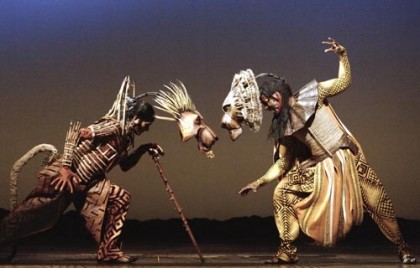
Sure, not every Disney production has been Tony worthy. (Though what these days is? Uh, hello: Memphis?? Ugh. And let’s not even get into the horror that was Catherine Zeta-Jones in Little Night Music. Wasn’t it hard for her to sing with the massive amounts of scenery she’s chewing?!) Ben Brantley of the Times called Tarzan a “giant, writhing green blob with music.” And, well, he wasn’t entirely off base. There are rumors that a revamped version plays amazingly well in Hamburg, Germany but I haven’t trusted the Germans since the Hapsburgs ruled Austria. But so what? Even Sondheim wrote Bounce or Road Show or whatever that junk is being called now.
This raising a burning question: what exactly is Disney really good at it besides making money? Some might say its stealing great talent and using it for their own nefarious purposes. I think that’s a particularly negative way of viewing things. Pastiche is often used in regards to Madonna, Lady Gaga or even Karl Lagerfeld when he channels Coco Chanel in his latest resort-wear collection. Homage is used by schmancy filmmakers ripping off other, more talented, directors. I think what Disney does is just recognize great talent and say to themselves “Hey, we’re gonna be making Hunchback of Notre Dame anyway because the Lord commanded it so why not hire some sexy show queens and their brethren and let them go at it?” And sometimes it works, and sometimes it doesn’t, but kudos to the execs in their glass offices for actually giving artists creative freedom to try something new. It’s not like the Roundabout allows for much of that anymore, if Promises, Promises is any indication.
As for what’s upcoming, Mr. Schumacher told me, “We are working with the New York Theatre Workshop on a show we created with Rick Elice, Roger Rees and Alex Timbers at the La Jolla Playhouse last year called Peter and the Starcatchers. It is a smaller-scaled ensemble piece based on the great series of books by Dave Barry and Ridley Pearson. On the larger scale, it has been reported that we are messing around with an interesting take on Dumbo with Stephen Daldry.”
Come on, aren’t you just DYING to find out what “messing around with Dumbo” means? I know I am! And if Disney is looking for a playwright to pen the book, well, they have my email.
David Ozanich writes the occasional play, teen novel, and travel guide among other things. His favorite musical is all of them.
The Anticipation List
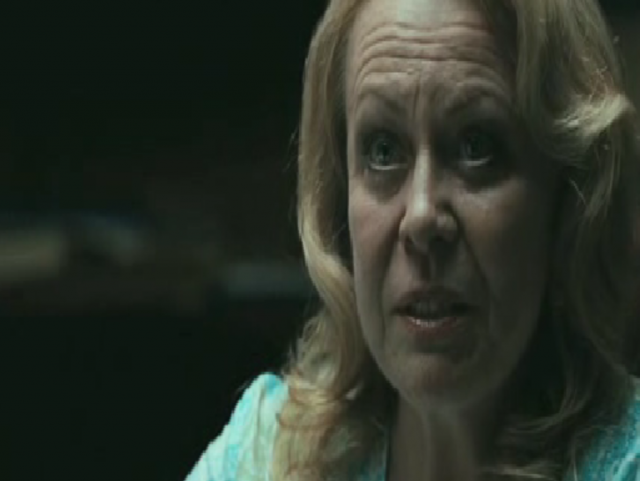
Good People with Frances McDormand, the Manhattan Theatre Club.
Robert Lepage’s Das Rheingold, Die Walkure, Siegfried and Gotterdammerung.
John Legend and The Roots, Wake Up.
You Lost Me There, Rosecrans Baldwin.
The Azure Ray tour.
Katrin Sigurdardottir at the Met.
The Social Network. (Well? Hated the script, but the trailer is just killing in theaters).
Centurion. What? Yup.
The Vimeo Awards.
Danny Meyer taking over the Whitney cafeteria.
Elizabeth Bishop and The New Yorker: The Complete Correspondence.
Nikita. Sorry, we can’t say no to the CW’s latest iteration! (We’re trying to say no to Hellcats but we’ll see. Ditto with Running Wilde on Fox.
And let who among us that is unintrigued by Machete cast the first stone.
Experimental Women in Flux at MoMA.
Kanye West taking Twitter down.
Animal Kingdom
Black Swan. (“Supernatural ballet thriller”!)
Ne-Yo, Libra Scale.
Sinatoro, Grant Morrison.
Antony and the Johnsons, Swanlight.
Every single forthcoming Helen Mirren movie, including The Debt and Red, but not so much The Tempest.
Jackass 3D. (I mean, come on.)
Sonny Rollins turning 80 in September.
Listen to This, Alex Ross
Boardwalk Empire.
More than anything: My Prizes, Thomas Bernhard.
